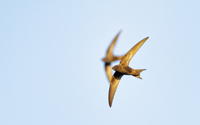POOR SUMMER FOR SWIFTS
SUMMER’S HERE, BUT TOO LATE FOR SWIFTS.
By WENDY JOHNSON.
Warmer, drier weather has arrived too late to help most Swifts this year – one of our most iconic summer birds.
Flocks of Swifts are beginning to be seen heading back to Africa following a ‘disastrous’ cold and wet breeding season.
The birds are already on the amber-list of conservation concern after declining by 31% between 1995 and 2009. The cold and wet spring and summer months this year have meant fewer flying insects for them and their chicks to feed on. More flying insects appearing now, thanks to the sunshine, will help them feed well ahead of the long flight to Africa, but experts warn their breeding success has already been affected this year.
Edward Mayer of Swift Conservation, says; ‘It has been a disastrous summer for many Swifts and we fully expect to see a decline in the breeding figures this year. People are telling us that the number of Swifts that arrived here several months ago was pretty consistent with last year, but after that they disappeared again as they flew away to wherever they could find food.
‘We’ve seen adult birds struggling through storms and ending up underweight because the cold and wet weather has meant fewer flying insects for them to feed on.
‘They are nesting, but as far as we can tell, without much success. Adults have even been pushing unhatched eggs out of their nests because they haven’t been able to feed themselves sufficiently, let alone incubate the eggs and feed young mouths too. The drier weather has unfortunately arrived too late for them.’
Aside from the weather, one of the main problems Swifts face is a lack of nesting sites. They nest in buildings, and most commonly in the roof space of people’s homes, but renovation of old buildings and the creation of new ones with no access or space for nests means they are being left homeless. The RSPB is keen to find out more so that it can help to tackle the decline.
Martin Harper, RSPB Conservation Director, says: ‘The last thing this struggling species needed was to be hit hard by the wet weather this year. But they are at the mercy of more than just a wet summer. Their ability to nest depends on our buildings having spaces for them. They fly as many as 6,000 miles each spring to get here from Africa to breed, only to find that changes in the way we’re building and renovating means there are fewer nest spaces. We need to make sure the right choices are made when building and developing so these birds aren’t left homeless.’
People are urged to submit details of Swift nests and groups of the birds flying at roof level and giving their characteristic ‘screaming’ call, which usually means they are nesting nearby, at www.rspb.org.uk/helpswifts. The information will be shared with local authorities, developers and architects, amongst others, to help them consider the needs of Swifts when building or renovating. Find out more about Swift Conservation at www.swift-conservation.org
Image credit: Richard Nicoll
About the Author
The RSPB speaks out for birds and wildlife, tackling the problems that threaten our environment. Nature is amazing – help us keep it that way. Click here to join today

